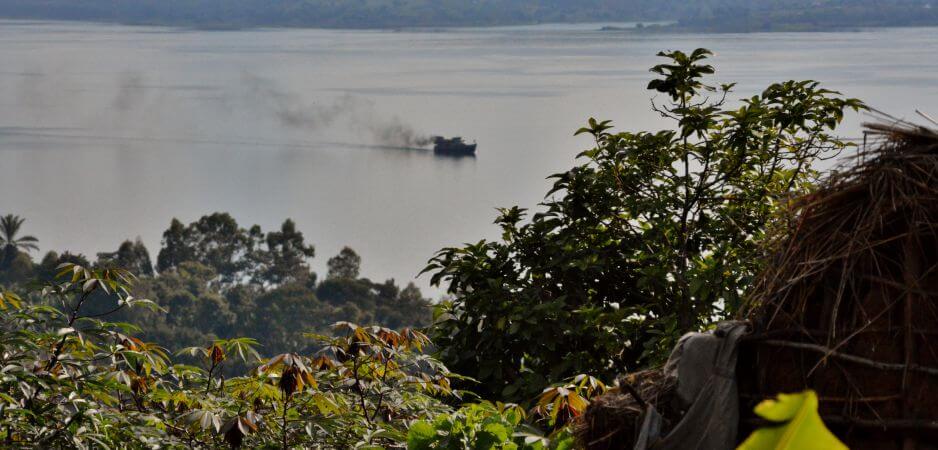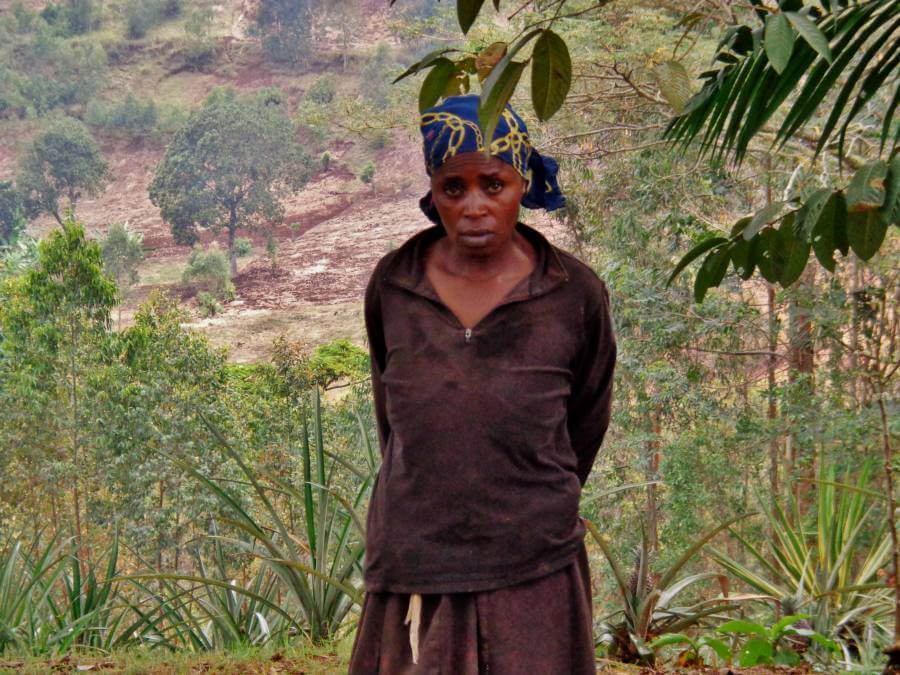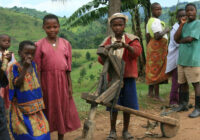An island on Lake Kivu provides a sanctuary from war in the region.
It only takes one hour to reach the island of Idjwi by speedboat that sails between two of the main cities in the Democratic Republic of Congo’s (DRC) South Kivu region, Goma and Bukavu. The lush green landscapes and relaxed, smiling faces you see when entering Idjwi could not represent a bigger contrast to Goma, where people are hardened by the everyday prospect of insecurity from crime, volcanic eruptions and violent conflict.
Idjwi is home to around 260,000 people and is located on the Congolese side of Lake Kivu. The population mainly speaks their own language, Kihavu, and apart from a few diesel generators and solar panels on the island, there is no electricity. Life in the small villages and communities evolves around the fertile green fields that make up the island and from fishing in the lake that surrounds it. Poverty is a reality, but so is the laid-back, relaxed atmosphere.
The South Kivu region is in many ways defined by wars and violence over access to power and minerals—the broken-down communities, decimated families, traumatized individuals. Prince Lubambo, one of the six local chiefs on Idjwi, is obviously proud when he explains how his community is nothing like that: “Idjwi does not know war. It’s a peaceful place. That is why when there is war and conflict in other areas, people like to come here.”
When things explode on the mainland, refugees find their way to the isolated and forgotten island, looking for a secure place to stay until peace prevails or to start a new life in safe surroundings.
Peace and Poverty
“We don’t have money to buy land, send our kids to school, and we can’t plan for the future,” says Bernadette who came to Idjwi from Rwanda for the first time in 1994. After losing her former husband in one of the refugee camps that was set up on the island during the genocide against the Tutsis, she continued to the neighboring Kalehe region in 1996. She returned to Idjwi looking for peace in 2009 after her current husband lost eight close family members to the fighting among local militias in Masisi, Kalehe. Despite the tough living conditions, Bernadette sees the family’s future on Idjwi, where they feel welcomed by the community and occasionally find work in the fields.
According to local journalist Yves Minani, 1994 to 1996 was an unusual period when the island received thousands of Rwandan refugees. The refugee camps on the island were infiltrated by Hutu soldiers who were still fighting the war in Rwanda. It was probably the first time the islanders heard gunshots. In spite of this, the local communities welcomed Rwandan refugees who were not involved in fighting and looting.
Butanda, another Rwandan refugee, quickly discovered that it was safer for him to move from the refugee camp to the local village. The chief made sure that he did not have to pay any rent to the family he stayed with. He decided to start a new life on Idjwi and has since made a living for himself and his family—a wife and nine children—from cultivating other people’s land and brewing the local banana wine, kasiksi. For Butanda it was an easy decision to stay in Idjwi: “I do not own any land back in Rwanda, so there was not a lot to return to. As I felt the love and hospitality of the local community here I decided that this was my new home.”
Despite having lived on the island for more than 20 years, Butanda still lives in poverty. He cannot afford to send his kids to school and sometimes receives help from neighbors to make sure his family has something to eat.
These days there are no refugee camps on Idjwi, and the island receives little support from the DRC government. This leaves a lot of responsibility to the chiefs in the local community who are required to report about refugees on the island to the authorities on the mainland, and organize that they are properly welcomed and introduced to the rules of the society. “The refugees have the same rights as everyone else on Idjwi. No discrimination,” says Prince Lubambo. “They are under the Congolese law. If someone behaves badly, they are punished.”
But the refugees don’t commit crimes. They live quiet lives and try to find work, so they can pay rent and provide food for their families. Often, they do not dare to dream of a bright future for themselves or their children. Peace is all that matters for now.
Escaping the Past
“The eruption of the volcano in 2002. The constant fighting among militias in Kalehe. When M23 entered Goma in 2013.” These are the first events that come to Prince Lubambo’s mind when asked about some examples that has led to a large influx of refugees coming to Idjwi. Many refugees’ stay is only temporary, as they want to return to their homes and lives on the mainland. Other refugees have fled from a past they cannot return to and do not have much choice other than to remain at Idjwi.
 Fair Observer provides you deep and diverse insights for free. Remember that we still have to pay for servers, website maintenance and much more. So, donate now to keep us free, fair and independent.
Fair Observer provides you deep and diverse insights for free. Remember that we still have to pay for servers, website maintenance and much more. So, donate now to keep us free, fair and independent.
Florence had never heard of Idjwi when she was sent there in around 2009. She is a small, soft-spoken woman wearing a long brown skirt, matching shirt and a colorful kitenge scarf on her head. Her troubles started when the feared Democratic Forces for the Liberation of Rwanda (FDLR) militia attacked her village close to Walungu in South Kivu. After hiding in the bush, the men in the village decided to take up the fight, and four people, including Florence’s husband, died in the battle.
Immediately after, Florence’s father-in-law wanted her to marry her husband’s younger brother, which she refused. The father-in-law then demanded that she should leave the house and took over all of their land. Florence did not have any land to cultivate and live from. She was alone and pregnant, with six children to care for. A local priest, and a man Florence had never met before, offered to send her and her children to Idjwi and to pay the rent for one year.
Florence felt abandoned and the initial arrangement did not work out well. Eventually she was taken in and given a job by nuns on the island, who are also helping two of her daughters to get an education. She still dreams of returning to her old community, but she has been advised against it by the local priest who believes her husband’s family would see Florence and her children’s return as a threat to their family land. So she stays in Idjwi despite being confused, lonely and constantly worried about her future: “Idjwi is a safe place, but it is not easy to live here. I don’t have my own place and will I ever be able to get any land? I worry what will happen when the nuns leave the island. Will the new nuns accept and support me?”
A shelter from the storm
Both in the DRC and Rwanda, Idjwi is surrounded by mystery. There are rumors that rituals from powerful sorcerers are part of everyday life on the island. People visit from Bukavu and Goma to seek advice and instructions from spiritually gifted men and women in order to find solutions to their personal problems. According to Yves Minani, witchcraft is not the reason that the population on Idjwi continues to live in relative harmony and have avoided to be part of any conflicts. It is the lake that protects the island. “People don’t want to fight on Idjwi. They fear the lake, just as there is no base to fight from or any places to hide,” he says.
According to a study published in 2012, the population on Idjwi rose from 112,000 in 1993 to an estimated 220,000 in 2010, due to one of the world’s highest fertility rates and the large influx of Rwandan and Congolese refugees settling on the island. With the large majority of people living off subsistence farming, it would be natural if the population worried about whether there will be enough space and resources to welcome more people. Minani is confident that this is not the case. “We know about the difficulties that refugees have, so there is solidarity in the society. Perhaps it will be people from Idjwi who need help another day. A lot of people are Christians out here, or follow other religions of love, and we want to do good.”
There are a lot of untold tragic stories on Idjwi, but the refugees do not meet to share their grief and receive support from each other. Some mention the expenses from cooking and providing drinks to guests as a reason why refugee gatherings are not organized, while others seem more comfortable with mourning their loss by themselves.
As the proud woman Kizenyi, who decided to stay on Idjwi after having lost her husband and three out of her four children in the refugee camps, explains it: “No one can know what another person is thinking.”
Kizenyi is now married and lives with a man from the local community who took her in when she had nowhere else to go. The house is modest, but the two of them look happy and relaxed as she tells her story. It’s a painful one, but it could have been much worse if the population of Idjwi had not provided her and other refugees a shelter from the storm.
The views expressed in this article are the author’s own and do not necessarily reflect Fair Observer’s editorial policy.
Photo Credit: Anders Jacobsen
Support Fair Observer
We rely on your support for our independence, diversity and quality.
For more than 10 years, Fair Observer has been free, fair and independent. No billionaire owns us, no advertisers control us. We are a reader-supported nonprofit. Unlike many other publications, we keep our content free for readers regardless of where they live or whether they can afford to pay. We have no paywalls and no ads.
In the post-truth era of fake news, echo chambers and filter bubbles, we publish a plurality of perspectives from around the world. Anyone can publish with us, but everyone goes through a rigorous editorial process. So, you get fact-checked, well-reasoned content instead of noise.
We publish 2,500+ voices from 90+ countries. We also conduct education and training programs
on subjects ranging from digital media and journalism to writing and critical thinking. This
doesn’t come cheap. Servers, editors, trainers and web developers cost
money.
Please consider supporting us on a regular basis as a recurring donor or a
sustaining member.
Will you support FO’s journalism?
We rely on your support for our independence, diversity and quality.








